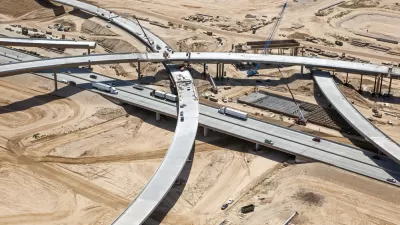"Everything we've heard about global urbanization turns out to be wrong."

"Widely accepted numbers on how much of the world's population lives in cities are incorrect, with major implications for development aid and the provision of public services for billions of people, researchers say."
Gregory Sruggs shares the news about the new analysis from the European Commission, which directly contradicts widely cited figures from the United Nations that half the world's population lives in cities.
"Using a definition made possible by advances in geospatial technology that uses high-resolution satellite images to determine the number of people living in a given area, they estimate 84 percent of the world's population, or almost 6.4 billion people, live in urban areas," according to Scruggs.
The article gets into the reasons for the discrepancy—caused by what the article describes as inaccuracies of the reporting used by the United Nations, caused in part by varying definitions of what defines an urban area. "For example, India defines a city as a place where at least 75 percent of males are not working in the agricultural sector," explains Scruggs.
While increasing the percentage and total number of people who live in urban areas, the point raised in a 2016 article still stands: talking about how many people live in urban areas in such broad and general terms reduces the differences between places (like the suburbs).
FULL STORY: ‘Everything we’ve heard about global urbanization turns out to be wrong’ - researchers

Planetizen Federal Action Tracker
A weekly monitor of how Trump’s orders and actions are impacting planners and planning in America.

Chicago’s Ghost Rails
Just beneath the surface of the modern city lie the remnants of its expansive early 20th-century streetcar system.

San Antonio and Austin are Fusing Into one Massive Megaregion
The region spanning the two central Texas cities is growing fast, posing challenges for local infrastructure and water supplies.

Since Zion's Shuttles Went Electric “The Smog is Gone”
Visitors to Zion National Park can enjoy the canyon via the nation’s first fully electric park shuttle system.

Trump Distributing DOT Safety Funds at 1/10 Rate of Biden
Funds for Safe Streets and other transportation safety and equity programs are being held up by administrative reviews and conflicts with the Trump administration’s priorities.

German Cities Subsidize Taxis for Women Amid Wave of Violence
Free or low-cost taxi rides can help women navigate cities more safely, but critics say the programs don't address the root causes of violence against women.
Urban Design for Planners 1: Software Tools
This six-course series explores essential urban design concepts using open source software and equips planners with the tools they need to participate fully in the urban design process.
Planning for Universal Design
Learn the tools for implementing Universal Design in planning regulations.
planning NEXT
Appalachian Highlands Housing Partners
Mpact (founded as Rail~Volution)
City of Camden Redevelopment Agency
City of Astoria
City of Portland
City of Laramie





























